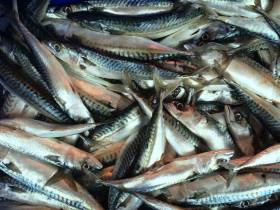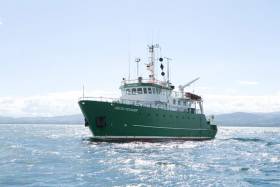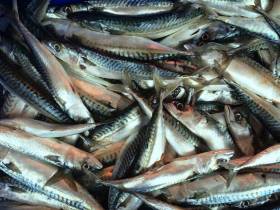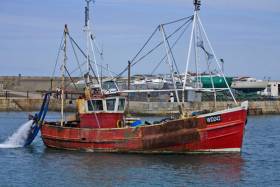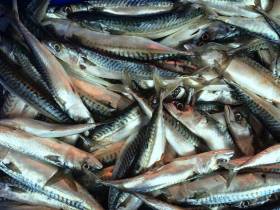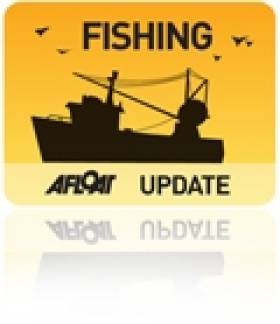Displaying items by tag: mackerel
Clonakilty Hosts Key Mackerel Quota Negotiations For 2019
Marine Minister Michael Creed welcomed today’s (Wednesday 7 November) resumption on Wednesday of important international negotiations on 2019 mackerel quotas for the stock in the North East Atlantic.
The negotiations, involving 11 EU and non-EU countries, are being hosted on behalf of the EU by the Department of Agriculture, Food & the Marine in the National Seafood Centre in Clonakilty, Co Cork and follow on from an initial round of negotiations in London in October.
“Mackerel is our single most important fishery economically and the negotiations this year are especially challenging given that the new scientific advice is for a reduction in quotas of 61%,” Minister Creed said.
“There are concerns from the scientific community about the quality of that advice but we need to take full account of all of the available information, the sustainability of the stock and the socio-economic importance of the mackerel fishery to peripheral coastal communities.
“These negotiations will be very difficult. The proposed 61% cut in the mackerel quota for 2019 would be very significant for our fishing industry along the western seaboard, particularly in Donegal, Galway, Kerry and Cork.
“Ireland is committed to the long-term sustainability of this stock and has worked hard to date to get a more graduated response to the scientific advice, taking account of the fact that this will be subject to a full review and quality assurance early in early 2019.”
Delegations from Ireland, the UK, France, Germany, the Netherlands, Denmark, Sweden, Norway, Iceland, Greenland and the Faeroe Islands will try and reach an agreement on the total allowable catch (TAC) for mackerel for 2019.
Up to 50 international delegates are expected in West Cork for the three-day negotiations. Officials from the Department of Agriculture, Food and the Marine, supported by scientists from the Marine Institute, will represent Ireland at these negotiations.
Minister Creed added: “I am pleased that Ireland, on behalf of the EU, is hosting this second round of Mackerel negotiations in the National Seafood Centre in Clonakilty. The fact that these negotiations are being facilitated by my department in Ireland underlines the economic importance of this stock to the Irish fishing industry.
“Mackerel is the single most valuable stock for the Irish fleet, and indeed the EU as a whole, and it is very much in our interests that we secure agreement at international level on management arrangements and catch levels for this stock.”
‘Operation Orca’ Set To Survey Scottish Killer Whales On Celtic Voyager
#MarineWildlife - The RV Celtic Voyager departed the Port of Cork yesterday (Wednesday 24 October) for ‘Operation Orca’, a 12-day survey of an offshore killer whale community associated with the Northeast Atlantic mackerel fishery.
A team of marine scientists from University College Cork is on board the research vessel that’s headed to waters east of the Orkneys, to study the orcas that feed on mackerel between October and February each year.
“This is the first time a dedicated research vessel will be heading up to study these killer whales and we are hopeful to come back with a lot of data,” said PhD researcher and chief scientist Róisín Pinfield in her introductory blog for the survey.
“We will have cameras, GoPros, drones, underwater hydrophones collecting acoustic data so we can hear the killer whales and a RIB so we can get in close if weather conditions allow. Time to pray to the weather gods to keep the storms away!”
The Scientists@Sea blog will be regularly updated by the Celtic Voyager team once they reach the fishing grounds and begin their survey, which runs till Sunday 4 November.
#Fishing - Marine Minister Michael Creed held a key bilateral meetings on the margins of the Agriculture and Fisheries Council in Luxembourg this week with his Danish and Spanish counterparts to discuss Brexit and fisheries priorities.
Minister Creed met the Danish minister for fisheries Eva Kjer Hansen on Brexit, with both ministers agreeing to continue to work together over the upcoming critical period to deliver on the EU guidelines for a future relationship in respect of fisheries.
Minister Creed also held a bilateral with the Spanish Minister for Agriculture, Fisheries and Food Luis Planas Puchades to discuss development of CAP strategic plans, as well as key concerns with regard to Brexit.
“I welcome the understanding that both Ministers demonstrated in our discussions today with regard to Brexit and its impact on both the Irish agri-food and fisheries sectors,” said Minister Creed yesterday (Monday 15 October).
“There is a strong appreciation of the Irish concerns in the context of Brexit negotiations and I very much welcome the ongoing support provided by my Danish and Spanish colleagues in this regard.”
Ministers Creed and Planas also reviewed challenging issues facing both member states in advance of the full introduction of the discards ban on 1 January next and setting quotas at the December fisheries council that supports the practical delivery of this new policy.
Minister Creed addressed the setting of the mackerel total allowable catch (TAC) and quotas for 2019 in a situation where the scientific advice advocates a 61% cut from 2018.
Minister Creed said: “We need to take full account of the concerns from the scientists themselves about this year’s advice and take account of the socio-economic importance of the mackerel fishery when deciding on a TAC for 2019.
“We must work closely at an EU level with Norway and the Faroe Islands, our partners in the management agreement, to reach a balanced outcome that avoids undue inter-annual fluctuation in the management of the stock.”
#Fishing - Marine Minister Michael Creed TD has launched a public consultation on the Inshore Fisheries Strategy, following a proposal made by the National Inshore Fisheries Forum.
The consultation process will be open for a seven-week period and is due to close on Friday 17 August.
The proposed strategy will frame the work of the Inshore Forums over the next number of years. It follows an extensive consultation process involving the National and Regional Inshore Fisheries Forums on initiatives that seek to cultivate a more sustainable, profitable and well-managed inshore fisheries sector.
This is the first time in the history of the State that inshore fishermen have set about developing a sector-specific strategy for themselves, the minister’s department added.
“I welcome the crucial role that the Inshore Fisheries Forums have played in its development and I am pleased that the Forum members are continuing to take the lead when it comes to engaging with issues that affect the inshore sector. I would like to thank BIM for facilitating the Forums in undertaking this task,” Minister Creed said.
The development of an inshore strategy will underpin a sustainable inshore fisheries sector and afford an opportunity to target funding support available under the European Maritime and Fisheries Fund to where it can be most effectively used.
“This is an opportunity for all interested parties to contribute their views on the development of the first strategic plan for the inshore sector,” the minister said. “It is critical that stakeholders have their views considered as this strategy will frame the work of the Inshore Forums over the next number of years and provide a clear direction for the development of the inshore sector.”
Interested parties are invited to view and complete the consultation available online.
Meanwhile, the European Commission has begun an investigation into the State’s monitoring of supertrawlers in Irish waters, according to The Irish Times.
Inconsistencies in Ireland’s mackerel fishery out of Killybegs prompted new controls by the Sea-Fisheries Protection Authority, which are currently under audit by the EU directorate-general for maritime affairs and fisheries.
Ireland’s mackerel quota, the second largest in the EU, was reduced for 2018 to just under 70,000 tonnes in last October’s international fisheries negotiations, as previously reported on Afloat.ie.
The Irish Times has more on the story HERE.
Irish Fishing Fleet Sees Fall In Mackerel Quota For 2018
#Fishing - The new mackerel quota for Irish fishermen for 2018 will be just under 70,000 tonnes (69,143 tonnes) with a landing value of €70 million.
The figure marks a reduction of more than 17,000 tonnes on the 2017 quota of 86,429 tonnes for Ireland’s most valuable fishery.
Marine Minister Michael Creed TD made the announcement after the international fisheries negotiations which concluded in London on Wednesday (11 October).
These negotiations — between the European Union, Norway, the Faroe Islands, Iceland and Greenland — were focused on the sustainable management of the €1 billion annual mackerel fishery in the North East Atlantic.
“Mackerel is our most valuable fishery and allied to the fact that we are the second-largest EU quota holder, these negotiations are always of crucial importance to the Irish fishing industry,” said Minister Creed.
“There was new scientific advice this year which showed that, while the stock is in good shape, a precautionary approach for long-term sustainability was necessary, with a significant reduction in quota recommended.
“Accordingly, following careful consideration of scientific advice of the International Council for the Exploration of the Seas (ICES) and discussions with the Marine Institute and industry stakeholders, I supported a reduction, in line with the agreed Long Term Management Strategy, in the quota for 2018.”
The current sharing arrangement for mackerel was agreed in 2014 between three parties only: the EU, Faeroes and Norway. An amount is held in reserve to accommodate the other parties.
This agreement is due to expire at the end of 2018, and it is expected that intensive negotiations on a new agreement will take place throughout next year.
“The quotas agreed for 2018 are consistent with the Long Term Management Strategy which aims to provide sustainability and stability in this hugely valuable fishery in line with the scientific advice,” Minister Creed added.
“In terms of the negotiations to come these are likely to be further complicated by Brexit. I remain dissatisfied with the 2014 agreement and will be working for a more equitable sharing arrangement that also protects the ongoing long-term sustainability of the mackerel stock.”
Irish Mackerel Quota for 2017 Increased by Over 10,500 Tonnes
Minister for Agriculture, Food and the Marine Michael Creed TD today welcomed the positive outcome for Irish Fishermen at the international fisheries negotiations which concluded today at the National Seafood Centre in Clonakilty, Co. Cork. These negotiations, between the European Union, Norway, the Faroe Islands, Iceland and Greenland were focused on the management of the €1billion annual mackerel fishery in the North East Atlantic.
The new mackerel quota for Irish fishermen for 2017 will be 86,429 tonnes - an increase of over 10,500 tonnes from 2016.
Minister Creed said:
“Mackerel is our most valuable fishery and allied to the fact that we are the second largest EU quota holder these negotiations are of crucial importance to the Irish fishing industry. In that context, I very much welcome the outcome of the international mackerel negotiations today, hosted by Ireland, in which Irish fishermen will now have over 10,500 tonnes more in 2017. This is worth over €10million directly to our catching sector with further value to be added by our mackerel processing factories in Donegal, Galway, Kerry and Cork”.
The current sharing arrangement for mackerel was agreed in 2014 between three parties only – EU, Faroes and Norway. An amount is held in reserve to accommodate the other parties. This agreement is due to expire in 2018 and it is expected that negotiations on a new agreement will commence in 2017.
The Minister added that:
“The quotas agreed for 2017 are consistent with the Long term Management Strategy agreed by the parties last year to provide sustainability and stability in this hugely valuable fishery in line with the scientific advice. Industry representatives, in particular, Sean O’Donoghue of the Killybegs Fishermen’s Organisation, Patrick Murphy of the Irish South & West Fishermen’s Organisation and Francis O’Donnell of the Irish Fish Producers Organisation were very helpful to the Irish negotiating team, throughout the negotiations .”
Ireland Hosts International Mackerel Negotiations in Clonakilty
Minister for Agriculture, Food & the Marine, Michael Creed T.D. today welcomed the start of important international fishing negotiations on the mackerel stock in the North East Atlantic. The negotiations are being hosted by the Department of Agriculture, Food & the Marine on behalf of the European Commission in the National Seafood Centre in Clonakilty, County Cork.
Minister Creed said that “I am very pleased that Ireland is, once again, hosting the very important Coastal State Mackerel negotiations. The fact that these negotiations are being held in Ireland emphasises the economic importance of this stock to the Irish fishing industry. Mackerel is the single most valuable stock for the Irish fleet and we need to secure agreement at international level on management arrangements and catch levels for this stock.”
Delegations from Ireland, the UK, France, Germany, Spain, the Netherlands, Denmark, Sweden, Norway, Iceland & the Faeroe Islands will try and reach an agreement on the total allowable catch (TAC) for mackerel for 2017. The Russian Federation and Greenland will also participate as observers. Up to 70 international delegates are expected in West Cork for the three day negotiations. Officials from the Department of Agriculture, Food and the Marine, supported by scientists from the Marine Institute, will represent Ireland at these negotiations.
Minister Creed went on to say that "Given the importance of Mackerel to both the Irish catching sector and to our seafood processing industry I very much hope that an agreement on sustainable catch levels for 2017 can be reached next week in the context of the Long Term Management Strategy agreed last year. Ireland currently has a quota of 75,000 tonnes – the second highest share in the EU – and we will be working to achieve an increase in line with the latest scientific advice”.
Marine Minister Welcomes Mackerel Deal
#Fishing - Marine Minister Simon Coveney has welcomed the positive outcome of the international fisheries negotiations that concluded today (Tuesday 27 October) at the National Seafood Centre in Clonakilty, Co Cork.
As previously reported on Afloat.ie, the negotiations between Norway, the Faroe Islands and the European Union concerned the management of mackerel in the North East Atlantic.
The mackerel quota for Irish fishermen for 2016 will be just over 75,000 tonnes. This reflects a precautionary approach in accordance with the latest scientific advice and the long-term management strategy also agreed between the parties today.
“I welcome the outcome of the international mackerel negotiations today, which Ireland not only hosted but was also a central participant as the second largest EU quota holder," said the minister.
"Irish fishermen will now have a quota of 75,000 tonnes, worth over €63m directly to our catching sector, for 2016 and the new long term management strategy will provide stability to our fishermen in this vital fishery for Ireland by avoiding large variations in the quota from year to year.”
Mackerel is Ireland’s single most valuable fishery and today’s agreement provides a high quota, stability and a framework to help ensure the long term sustainability of the stock.
The latest agreement builds on the five-year sharing agreement reached in March 2014 between those parties. Further discussions on that agreement are expected in the coming months.
Minister Coveney added that “while the quota achieved by Ireland is less than that of the last two years, those quotas were unusually high by historical standards.
"The quota of 75,000 tonnes achieved today is considerably higher than our historical average quota of approximately 54,000 tonnes, apart from the last two years. Crucially, for the sustainability and stability of this vital fishery for Ireland, we now also have a long-term management strategy in place for mackerel.
"As always, industry representatives, in particular, Sean O’Donoghue of the Killybegs Fishermens Organisation were extremely helpful to the Irish negotiating team.”
Coveney Welcomes Mackerel Negotiations in Clonakilty
Minister for Agriculture, Food & the Marine, Simon Coveney TD today welcomed the start of important international negotiations on the mackerel stock in the North East Atlantic. The negotiations are being hosted by the Department of Agriculture, Food & the Marine on behalf of Ireland in the National Seafood Centre in Clonakilty, County Cork.
Minister Coveney said that “I am very pleased that Ireland is hosting these negotiations. Mackerel is the single most important stock for the Irish fleet and we need to secure agreement at international level on management arrangements for this stock. I very much hope that agreement on a sustainable strategy can be reached this week at what I am sure will be intensive and difficult talks.”
The aim of the negotiations is to try and reach agreement between the EU, Norway, Iceland & the Faeroe Islands on the total allowable catch (TAC) for mackerel for 2016. The Russian Federation and Greenland will also participate as observers. Up to 70 international delegates are expected in West Cork for the three day negotiations.
Minister Coveney went on to say that "Mackerel is very important both for the Irish catching sector and to our seafood processing industry in Donegal and along the western seaboard and provides significant seasonal employment in Donegal, Galway, Kerry and Cork. Our aim this week and always is to have a sustainable long term management strategy for this vital shared stock.”
Officials from the Department of Agriculture, Food and the Marine, supported by scientists from the Marine Institute will represent Ireland at these negotiations.
Coveney Calls For Emergency Fund To Help Sanction-Hit Mackerel Fishermen
#Fishing - Marine Minister Simon Coveney wants an emergency fund to assist Irish mackerel fishermen who have been hit by Russia's ban on EU imports in the wake of the Ukraine crisis.
As RTÉ News reports, Minister Coveney made the call at an emergency meeting of Europe's farming and fisheries ministers in Brussels yesterday (Friday 5 September), arguing that support provided to farmers should extend to the fishing sector.
Russia accounts for 25% of all mackerel exports from Ireland, and the minister added that Russia's EU seafood ban "means this is a big fisheries issue as well as an agri-food issue."
A €200 million fund has already been put in place to cover storage of goods that would have otherwise gone to Russia, and to redirect exports to new markets.
RTÉ News has more on the story HERE.



























